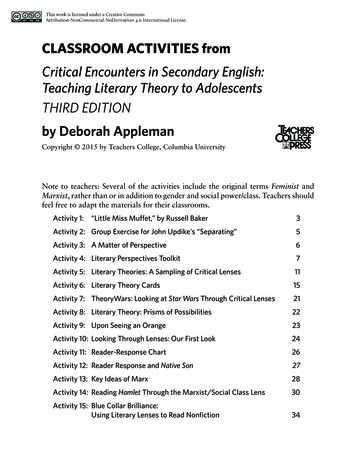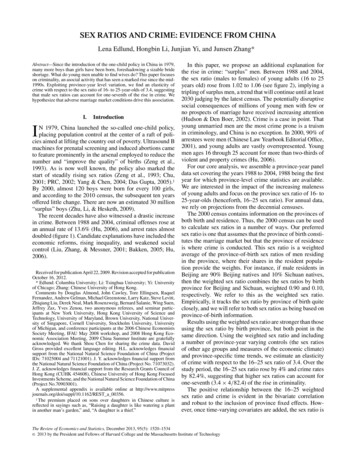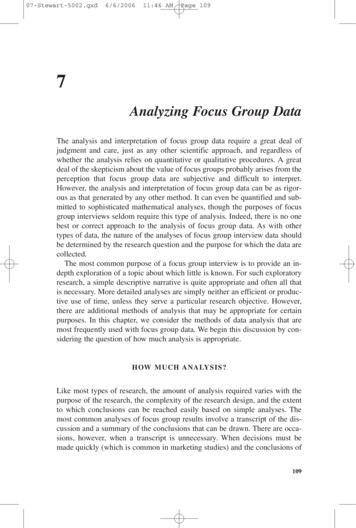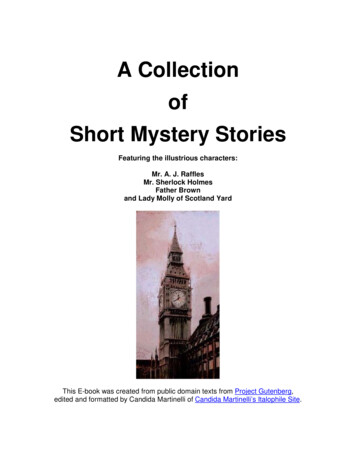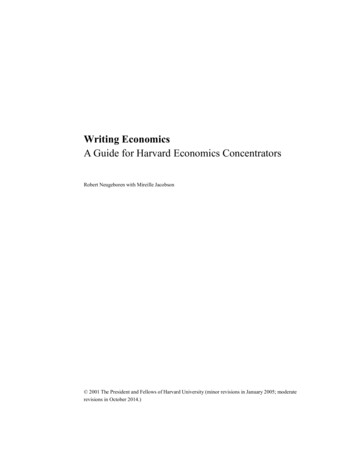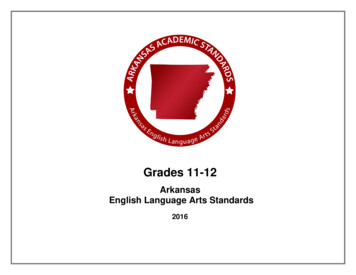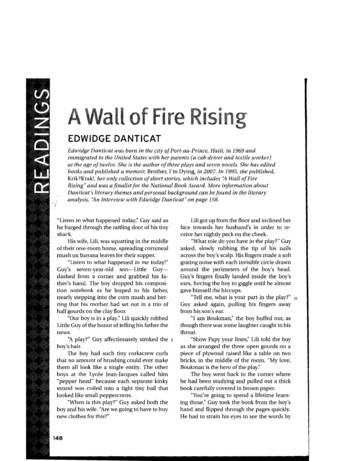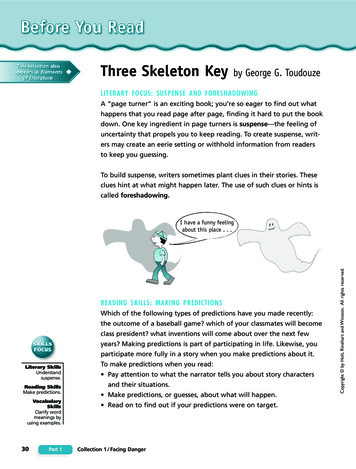
Transcription
Three Skeleton Keyby George G. ToudouzeLITERARY FOCUS: SUSPENSE AND FORESHADOWINGA “page turner” is an exciting book; you’re so eager to find out whathappens that you read page after page, finding it hard to put the bookdown. One key ingredient in page turners is suspense—the feeling ofuncertainty that propels you to keep reading. To create suspense, writers may create an eerie setting or withhold information from readersto keep you guessing.To build suspense, writers sometimes plant clues in their stories. Theseclues hint at what might happen later. The use of such clues or hints iscalled foreshadowing.READING SKILLS: MAKING PREDICTIONSWhich of the following types of predictions have you made recently:the outcome of a baseball game? which of your classmates will becomeclass president? what inventions will come about over the next fewyears? Making predictions is part of participating in life. Likewise, youparticipate more fully in a story when you make predictions about it.Literary SkillsUnderstandsuspense.Reading SkillsMake predictions.VocabularySkillsClarify wordmeanings byusing examples.30Part 1To make predictions when you read: Pay attention to what the narrator tells you about story charactersand their situations. Make predictions, or guesses, about what will happen. Read on to find out if your predictions were on target.Collection 1 / Facing DangerCopyright by Holt, Rinehart and Winston. All rights reserved.I have a funny feelingabout this place . . .
PREVIEW SELECTION VOCABULARYThe following words appear in “Three Skeleton Key.” Take time topreview these words before you begin the story.hordes (hôrdz) n.: large, moving crowds.The rats swam ashore in hordes.receding (ri·s d i«) v. used as adj.: movingback.At first the ship came toward us, but then itdrifted off in the receding waters.edible (ed ·b l) adj.: fit to be eaten.The rats thought the men were edible.derisive (di·r siv) adj.: scornful and ridiculing.The rats peered with derisive eyes at theterrified men.fathom (faƒ m) v.: understand.The lighthouse keepers couldn’t fathom therats’ nasty reaction.CLARIFYING WORD MEANINGS: EXAMPLESSometimes you can figure out the meaning of an unfamiliar word byCopyright by Holt, Rinehart and Winston. All rights reserved.looking in the text for examples of what it is. Words and phrases, suchas for example, for instance, like, such as, in this case, and as if, sometimes signal that an example will follow.Read each passage below, and underline the example provided foreach boldface word.1. Hordes of people went to the concert. In this case, there wereliterally thousands of music lovers crowding the stadium.2. We just could not fathom the reason for his actions. For example,the more we thought, the more we were puzzled.3. The guest asked if the food was edible, as if the spaghetti andmeatballs were going to poison her!Three Skeleton Key31
George G. ToudouzeMy most terrifying experience? Well, one does have a fewin thirty-five years of service in the Lights, although it’sPause at line 4. What kindof story might this be?mostly monotonous, routine work—keeping the light inorder, making out the reports.When I was a young man, not very long in the service,there was an opening in a lighthouse newly built off thecoast of Guiana, on a small rock twenty miles or so fromthe mainland. The pay was high, so in order to reach thesum I had set out to save before I married, I volunteered10for service in the new light.Three Skeleton Key, the small rock on which the lightstood, bore a bad reputation. It earned its name from thestory of the three convicts who, escaping from Cayenne ina stolen dugout canoe, were wrecked on the rock duringRe-read lines 11–20. Whatforeshadowing clues doesthe writer give here? Circlethem. What do those clueshint at?the night, managed to escape the sea, but eventually diedof hunger and thirst. When they were discovered, nothingremained but three heaps of bones, picked clean by thebirds. The story was that the three skeletons, gleamingwith phosphorescent1 light, danced over the small rock,20screaming. . . .But there are many such stories and I did not give the“Three Skeleton Key” by George G. Toudouzefrom Esquire, January 1937. Copyright 1937by Hearst Communications, Inc. All rightsreserved. Esquire is a trademark of HearstMagazines Property, Inc. Reproduced bypermission of Esquire Magazine.32Part 1warnings of the old-timers at the Île-de-Seine2 a second1. phosphorescent (fäs f ·res nt) adj.: glowing.2. Île-de-Seine ( l d sen ).Collection 1 / Facing DangerCopyright by Holt, Rinehart and Winston. All rights reserved.Key (k ), in line 11, means“island.” The words cay andquay are alternate formsof key.
thought. I signed up, boarded ship, and in a month I wasinstalled at the light.Picture a gray, tapering cylinder,3 welded to the solidblack rock by iron rods and concrete, rising from a smallisland twenty-odd miles from land. It lay in the midst ofPause at line 39. What doyou think might happen laterin the story, based on theinformation you just read?the sea, this island, a small, bare piece of stone, about onehundred fifty feet long, perhaps forty wide. Small, barely30large enough for a man to walk about and stretch his legsat low tide.This is an advantage one doesn’t find in all lights,however, for some of them rise sheer from the waves, withno room for one to move save within the light itself. Still,on our island, one must be careful, for the rocks weretreacherously smooth. One misstep and down you wouldfall into the sea—not that the risk of drowning was so great,but the waters about our island swarmed with huge sharks,who kept an eternal patrol around the base of the light.40Still, it was a nice life there. We had enough provisionsto last for months, in the event that the sea should becomeCopyright by Holt, Rinehart and Winston. All rights reserved.too rough for the supply ship to reach us on schedule.During the day we would work about the light, cleaning therooms, polishing the metalwork and the lens and reflectorof the light itself, and at night we would sit on the galleryand watch our light, a twenty-thousand-candlepowerlantern, swinging its strong white bar of light over the seafrom the top of its hundred-twenty-foot tower. Some days,when the air would be very clear, we could see the land,50a threadlike line to the west. To the east, north, and southstretched the ocean. Landsmen, perhaps, would soon havetired of that kind of life, perched on a small island off thecoast of South America for eighteen weeks until one’s turnfor leave ashore came around. But we liked it there, my two3. tapering cylinder: tube shape that gradually narrows toward one end;in this case, toward the top.Three Skeleton Key33
fellow tenders and myself—so much so that for twenty-twomonths on end, with the exception of shore leaves, I wasThe verb tend means “takecare of” or “look after.”Re-read the sentence containing the word tenders,in lines 54–57. Whatdoes tenders mean in thissentence?greatly satisfied with the life on Three Skeleton Key.I had just returned from my leave at the end of June,that is to say, midwinter in that latitude, and had settled60down to the routine with my two fellow keepers, a Breton4by the name of Le Gleo and the head keeper, Itchoua, aBasque5 some dozen years or so older than either of us.Eight days went by as usual; then on the ninth nightafter my return, Itchoua, who was on night duty, called LeGleo and me, sleeping in our rooms in the middle of thetower, at two in the morning. We rose immediately and,climbing the thirty or so steps that led to the gallery, stoodbeside our chief.Itchoua pointed, and following his finger, we saw a big70three-master, with all sail set, heading straight for the light.A queer course, for the vessel must have seen us; our lightlit her with the glare of day each time it passed over her.Now, ships were a rare sight in our waters, for our lightsurface and running far out to sea. Consequently we werealways given a wide berth, especially by sailing vessels,which cannot maneuver as readily as steamers.No wonder that we were surprised at seeing this threemaster heading dead for us in the gloom of early morning. I80had immediately recognized her lines, for she stood out plainly, even at the distance of a mile, when our light shone on her.She was a beautiful ship of some four thousand tons,a fast sailer that had carried cargoes to every part of theworld, plowing the seas unceasingly. By her lines she wasRe-read lines 63–81, in whichsuspense begins to build.Underline the words andphrases that build suspense.34Part 1identified as Dutch built, which was understandable, asParamaribo and Dutch Guiana are very close to Cayenne.4. Breton (bret ’n): person from Brittany, a region of northern France.5. Basque (bask): Basques are people living in the Pyrenees, a mountainrange in France and Spain.Collection 1 / Facing DangerCopyright by Holt, Rinehart and Winston. All rights reserved.was a warning of treacherous reefs, barely hidden under the
Watching her sailing dead for us, a white wave boilingunder her bows, Le Gleo cried out:“What’s wrong with her crew? Are they all drunk or90insane? Can’t they see us?”Pause at line 90. What mighthave happened to the ship’screw?Itchoua nodded soberly and looked at us sharply as heremarked: “See us? No doubt—if there is a crew aboard!”“What do you mean, chief?” Le Gleo had started,turned to the Basque. “Are you saying that she’s the FlyingDutchman?”6His sudden fright had been so evident that the olderman laughed:“No, old man, that’s not what I meant. If I say that noone’s aboard, I mean she’s a derelict.”7100Then we understood her queer behavior. Itchoua wasright. For some reason, believing her doomed, her crew hadabandoned her. Then she had righted herself and sailed on,wandering with the wind.The three of us grew tense as the ship seemed aboutto crash on one of our numerous reefs, but she suddenlyCopyright by Holt, Rinehart and Winston. All rights reserved.lurched with some change of the wind, theyards8swungaround, and the derelict came clumsily about and saileddead away from us.Skim lines 78–108, and circlethe word dead each time itappears. What effect doesthis repetition have on you,the reader?In the light of our lantern she seemed so sound, so110strong, that Itchoua exclaimed impatiently:“But why the devil was she abandoned? Nothing issmashed, no sign of fire—and she doesn’t sail as if she weretaking water.”Le Gleo waved to the departing ship:“Bon voyage!” he smiled at Itchoua and went on. “She’sleaving us, chief, and now we’ll never know what—”6. Flying Dutchman: fabled Dutch ghost ship whose captain is said to becondemned to sail the seas until Judgment Day. Seeing the FlyingDutchman is supposed to bring bad luck.7. derelict (der ·likt ) n.: here, abandoned ship.8. yards n.: in nautical terms, rods fastened across the masts to supportthe sails.Three Skeleton Key35
“No, she’s not!” cried the Basque. “Look! She’s turning!”As if obeying his words, the derelict three-masterPause at line 123. Throughoutthe story the writer speaksof the mysterious ship as if itwere alive. In what way doesthis use of personificationcreate suspense?stopped, came about, and headed for us once more. And120for the next four hours the vessel played around us—zigzagging, coming about, stopping, then suddenly lurchingforward. No doubt some freak of current and wind, ofwhich our island was the center, kept her near us.Then suddenly the tropic dawn broke, the sun rose,and it was day, and the ship was plainly visible as she sailedpast us. Our light extinguished, we returned to the gallerywith our glasses9 and inspected her.The three of us focused our glasses on her poop10 andsaw, standing out sharply, black letters on the white back-130ground of a life ring, the stenciled name “Cornelius de Witt,Rotterdam.”We had read her lines correctly: She was Dutch. Justthen the wind rose and the Cornelius de Witt changedcourse, leaned to port, and headed straight for us oncemore. But this time she was so close that we knew she“Thunder!” cried Le Gleo, his Breton soul aching atseeing a fine ship doomed to smash upon a reef, “she’sgoing to pile up! She’s gone!”I shook my head:140“Yes, and a shame to see that beautiful ship wreck herself. And we’re helpless.”There was nothing we could do but watch. A ship sailing with all sail spread, creaming the sea with her forefoot asshe runs before the wind, is one of the most beautiful sightsin the world—but this time I could feel the tears stinging inmy eyes as I saw this fine ship headed for her doom.9. glasses n.: here, binoculars.10. poop n.: in nautical terms, the stern (back) deck of a ship.36Part 1Collection 1 / Facing DangerCopyright by Holt, Rinehart and Winston. All rights reserved.would not turn in time.
All this time our glasses were riveted on her and wesuddenly cried out together:150“The rats!”hordes (hôrdz) n.: large,moving crowds.Now we knew why this ship, in perfect condition, wassailing without her crew aboard. They had been driven outby the rats. Not those poor specimens of rats you see ashore,barely reaching the length of one foot from their tremblingPause at line 169. Predictwhat role the rats may playlater in the story.noses to the tip of their skinny tails, wretched creatures thatCopyright by Holt, Rinehart and Winston. All rights reserved.dodge and hide at the mere sound of a footfall.No, these were ships’ rats, huge, wise creatures, bornon the sea, sailing all over the world on ships, transferringto other, larger ships as they multiply. There is as much160difference between the rats of the land and these maritimerats as between a fishing smack11 and an armored cruiser.The rats of the sea are fierce, bold animals. Large,strong, and intelligent, clannish and seawise, able to put thebest of mariners to shame with their knowledge of the sea,their uncanny ability to foretell the weather.And they are brave, these rats, and vengeful. If you somuch as harm one, his sharp cry will bring hordes of hisfellows to swarm over you, tear you, and not cease untilyour flesh has been stripped from the bones.11. smack n.: here, small sailboat.Three Skeleton Key37
The ones on this ship, the rats of Holland, are the worst,170Notessuperior to other rats of the sea as their brethren are to theland rats. There is a well-known tale about these animals.A Dutch captain, thinking to protect his cargo,brought aboard his ship not cats but two terriers, dogstrained in the hunting, fighting, and killing of vicious rats.By the time the ship, sailing from Rotterdam, had passedthe Ostend light, the dogs were gone and never seen again.In twenty-four hours they had been overwhelmed, killed,and eaten by the rats.At times, when the cargo does not suffice,12 the rats180attack the crew, either driving them from the ship or eatingthem alive. And studying the Cornelius de Witt, I turnedsick, for her small boats were all in place. She had not beenabandoned.Re-read lines 180–187. Whathappened to the ship’s crew?Over her bridge, on her deck, in the rigging, on everyvisible spot, the ship was a writhing mass—a starving armycoming toward us aboard a vessel gone mad!Our island was a small spot in that immense stretch190starboard with its ravening13 cargo—but no, she came forus at full speed, as if she were leading the regatta at a race,and impaled herself on a sharp point of rock.There was a dull shock as her bottom stove in,14 thena horrible crackling as the three masts went overboard atonce, as if cut down with one blow of some gigantic sickle.A sighing groan came as the water rushed into the ship;then she split in two and sank like a stone.But the rats did not drown. Not these fellows! As muchat home in the sea as any fish, they formed ranks in the12. suffice (s ·f s ) v.: provide enough.13. ravening (rav ·ni«) adj.: greedily searching for animals to kill forfood. A more common related word is ravenous (rav ·n s), meaning“wildly, greedily hungry.”14. stove in: caved in.38Part 1Collection 1 / Facing DangerCopyright by Holt, Rinehart and Winston. All rights reserved.of sea. The ship could have grazed us or passed to port or
200water, heads lifted, tails stretched out, paws paddling. Andhalf of them, those from the forepart of the ship, sprangalong the masts and onto the rocks in the instant before shesank. Before we had time even to move, nothing remainedreceding (ri·s d i«) v. used asadj.: moving back.of the three-master save some pieces of wreckage floatingon the surface and an army of rats covering the rocks leftbare by the receding tide.Thousands of heads rose, felt the wind, and we werePause at line 212. What hasjust happened to increaseyour feeling of suspense?scented, seen! To them we were fresh meat, after possibleweeks of starving. There came a scream, composed of innu210merable screams, sharper than the howl of a saw attackinga bar of iron, and in the one motion, every rat leaped toattack the tower!We barely had time to leap back, close the door leadingonto the gallery, descend the stairs, and shut every windowtightly. Luckily the door at the base of the light, which wenever could have reached in time, was of bronze set ingranite and was tightly closed.The horrible band, in no measurable time, had swarmedCopyright by Holt, Rinehart and Winston. All rights reserved.up and over the tower as if it had been a tree, piled on the220embrasures15 of the windows, scraped at the glass with thousands of claws, covered the lighthouse with a furry mantle,and reached the top of the tower, filling the gallery and pilingatop the lantern.Underline the words andphrases in lines 224–231 thatappeal to your senses ofsight, smell, and hearing.Why might the writer havechosen to describe the ratsin such detail?Their teeth grated as they pressed against the glass ofthe lantern room, where they could plainly see us, thoughthey could not reach us. A few millimeters of glass, luckilyvery strong, separated our faces from their gleaming, beadyeyes, their sharp claws and teeth. Their odor filled thetower, poisoned our lungs, and rasped our nostrils with a230pestilential, nauseating smell. And there we were, sealedalive in our own light, prisoners of a horde of starving rats.15. embrasures (em·br† rz) n.: slanted openings.Three Skeleton Key39
That first night, the tension was so great that we couldNotesnot sleep. Every moment, we felt that some opening hadbeen made, some window given way, and that our horriblebesiegers were pouring through the breach. The rising tide,chasing those of the rats which had stayed on the barerocks, increased the numbers clinging to the walls, piled onthe balcony—so much so that clusters of rats clinging toone another hung from the lantern and the gallery.With the coming of darkness we lit the light and the240turning beam completely maddened the beasts. As the lightturned, it successively blinded thousands of rats crowdedagainst the glass, while the dark side of the lantern roomgleamed with thousands of points of light, burning like theeyes of jungle beasts in the night.All the while we could hear the enraged scraping ofclaws against the stone and glass, while the chorus of crieswas so loud that we had to shout to hear one another. Fromtime to time, some of the rats fought among themselves250and a dark cluster would detach itself, falling into the searescent streaks as triangular fins slashed the water—sharks,Read the boxed passagealoud several times. The firsttime read slowly, for sense.Then, experiment with thetone of your voice and itsvolume to bring the vivid passage to life for your listeners.Note: The letter combinationof ph in phosphorescent ispronounced “f”.permanent guardians of our rock, feasting on our jailers.The next day we were calmer and amused ourselvesteasing the rats, placing our faces against the glass whichseparated us. They could not fathom the invisible barrierwhich separated them from us, and we laughed as wewatched them leaping against the heavy glass.But the day after that, we realized how serious our260fathom (faƒ m) v.: understand; get to the bottom of.Fathom is also a noun meaning “a length of six feet.” Afathom is a unit of measurefor depth of water.40Part 1position was. The air was foul; even the heavy smell of oilwithin our stronghold could not dominate the fetid odor ofthe beasts massed around us. And there was no way ofadmitting fresh air without also admitting the rats.Collection 1 / Facing DangerCopyright by Holt, Rinehart and Winston. All rights reserved.like a ripe fruit from a tree. Then we would see phospho-
The morning of the fourth day, at early dawn, I sawthe wooden framework of my window, eaten away fromthe outside, sagging inwards. I called my comrades and thethree of us fastened a sheet of tin in the opening, sealing ittightly. When we had completed that task, Itchoua turnedto us and said dully:270Pause at line 274. Do youthink the three lighthousekeepers will die? Will theychange the name of theisland to Six Skeleton Key?Explain.“Well—the supply boat came thirteen days ago, andshe won’t be back for twenty-nine.” He pointed at the whitemetal plate sealing the opening through the granite. “If thatgives way”—he shrugged—“they can change the name ofthis place to Six Skeleton Key.”The next six days and seven nights, our only distraction was watching the rats whose holds were insecure falla hundred and twenty feet into the maws of the sharks—but they were so many that we could not see any diminution in their numbers.280Thinking to calm ourselves and pass the time, weattempted to count them, but we soon gave up. Theymoved incessantly, never still. Then we tried identifyingCopyright by Holt, Rinehart and Winston. All rights reserved.them, naming them.Re-read the sentence in lines281–282, and look for a context clue that helps you defineincessantly. Underline the clue.What does incessantly mean?Stephen Dalton/Photo Researchers.Three Skeleton Key41
One of them, larger than the others, who seemed toNoteslead them in their rushes against the glass separating us, wenamed “Nero”;16 and there were several others whom wehad learned to distinguish through various peculiarities.But the thought of our bones joining those of the convicts was always in the back of our minds. And the gloom290of our prison fed these thoughts, for the interior of thelight was almost completely dark, as we had had to sealevery window in the same fashion as mine, and the onlyspace that still admitted daylight was the glassed-in lanternroom at the very top of the tower.Then Le Gleo became morose and had nightmares inwhich he would see the three skeletons dancing aroundhim, gleaming coldly, seeking to grasp him. His maniacal,The word maniacal in line 297is used to describe Le Gleo’swild descriptions of hisnightmares. Maniacal(m ·n ·k l) is built on thenoun maniac.raving descriptions were so vivid that Itchoua and I beganseeing them also.It was a living nightmare, the raging cries of the rats as300they swarmed over the light, mad with hunger; the sickening, strangling odor of their bodies—to reach the mast on which to hang the signal, we wouldhave to go out on the gallery where the rats were.There was only one thing left to do. After debating allof the ninth day, we decided not to light the lantern thatnight. This is the greatest breach of our service, never committed as long as the tenders of the light are alive; for the310light is something sacred, warning ships of danger in thenight. Either the light gleams a quarter-hour after sundown, or no one is left alive to light it.Well, that night, Three Skeleton Light was dark, and allthe men were alive. At the risk of causing ships to crash onour reefs, we left it unlit, for we were worn out—going mad!16. Nero (nir ): emperor of Rome (A.D. 54–68) known for his cruelty.42Part 1Collection 1 / Facing DangerCopyright by Holt, Rinehart and Winston. All rights reserved.True, there is a way of signaling from lighthouses. But
At two in the morning, while Itchoua was dozing inhis room, the sheet of metal sealing his window gave way.The chief had just time enough to leap to his feet and cryfor help, the rats swarming over him.320But Le Gleo and I, who had been watching from thePause at line 319. The window that had been keepingthe rats out just gave way.What will happen next?lantern room, got to him immediately, and the three ofus battled with the horde of maddened rats which flowedthrough the gaping window. They bit, we struck themdown with our knives—and retreated.We locked the door of the room on them, but beforewe had time to bind our wounds, the door was eatenthrough and gave way, and we retreated up the stairs, fighting off the rats that leaped on us from the knee-deepswarm.330I do not remember, to this day, how we ever managedto escape. All I can remember is wading through them upthe stairs, striking them off as they swarmed over us; andthen we found ourselves, bleeding from innumerable bites,our clothes shredded, sprawled across the trapdoor in theIn lines 320–329, the suspensebuilds. What unansweredquestion is going throughyour mind at this point?Copyright by Holt, Rinehart and Winston. All rights reserved.floor of the lantern room—without food or drink. Luckily,the trapdoor was metal, set into the granite with iron bolts.The rats occupied the entire light beneath us, and on thefloor of our retreat lay some twenty of their fellows, who hadgotten in with us before the trapdoor closed and whom we340had killed with our knives. Below us, in the tower, we couldhear the screams of the rats as they devoured everythingedible that they found. Those on the outside squealed inreply and writhed in a horrible curtain as they stared at usthrough the glass of the lantern room.Itchoua sat up and stared silently at his blood tricklingfrom the wounds on his limbs and body and running inthin streams on the floor around him. Le Gleo, who wasin as bad a state (and so was I, for that matter), stared atedible (ed ·b l) adj.: fit tobe eaten.Three Skeleton Key43
the chief and me vacantly, started as his gaze swung to theNotes350multitude of rats against the glass, then suddenly beganlaughing horribly:“Hee! Hee! The Three Skeletons! Hee! Hee! The ThreeSkeletons are now six skeletons! Six skeletons!”He threw his head back and howled, his eyes glazed, atrickle of saliva running from the corners of his mouth andthinning the blood flowing over his chest. I shouted to himto shut up, but he did not hear me, so I did the only thingI could to quiet him—I swung the back of my hand acrosshis face.The howling stopped suddenly, and his eyes swung360around the room; then he bowed his head and began weeping softly, like a child.Our darkened light had been noticed from the mainland, and as dawn was breaking, the patrol was there toinvestigate the failure of our light. Looking through mybinoculars, I could see the horrified expression on the facesof the officers and crew when, the daylight strengthening,rats. They thought, as I afterwards found out, that we had370been eaten alive.But the rats had also seen the ship or had scented theRe-read lines 363–378. Whydidn’t the officers on thepatrol ship stay and rescuethe keepers?crew. As the ship drew nearer, a solid phalanx17 left thelight, plunged into the water, and swimming out, attemptedto board her. They would have succeeded, as the ship washove to;18 but the engineer connected his steam to a hoseon the deck and scalded the head of the attacking column,which slowed them up long enough for the ship to getunder way and leave the rats behind.Then the sharks took part. Belly up, mouths gaping,380they arrived in swarms and scooped up the rats, sweeping17. phalanx (f† la«ks ) n.: closely packed group. A phalanx is an ancientmilitary formation, and the word still has warlike connotations.18. hove to: stopped by being turned into the wind.44Part 1Collection 1 / Facing DangerCopyright by Holt, Rinehart and Winston. All rights reserved.they saw the light completely covered by a seething mass of
Notes CORBIS.through them like a sickle through wheat. That was one daythat sharks really served a useful purpose.The remaining rats turned tail, swam to the shore, andCopyright by Holt, Rinehart and Winston. All rights reserved.emerged dripping. As they neared the light, their comradesgreeted them with shrill cries, with what sounded like aderisive note predominating. They answered angrily andderisive (di·r siv) adj.: scornful and ridiculing.mingled with their fellows. From the several tussles thatbroke out, it seemed as if they resented being ridiculed fortheir failure to capture the ship.390But all this did nothing to get us out of our jail. Thesmall ship could not approach but steamed around thelight at a safe distance, and the tower must have seemedfantastic, some weird, many-mouthed beast hurling defiance at them.Finally, seeing the rats running in and out of the towerthrough the door and the windows, those on the ship decidedthat we had perished and were about to leave when Itchoua,regaining his senses, thought of using the light as a signal.He lit it and, using a plank placed and withdrawn before theThree Skeleton Key45
400beam to form the dots and dashes, quickly sent out our storyto those on the vessel.Our reply came quickly. When they understood ourRe-read lines 399–401. Whatdoes Itchoua do to signalthat he and the otherkeepers are still alive?position—how we could not get rid of the rats, Le Gleo’smind going fast, Itchoua and myself covered with bites,cornered in the lantern room without food or water—theyhad a signalman send us their reply.His arms swinging like those of a windmill, he quicklyspelled out:“Don’t give up, hang on a little longer! We’ll get you out410of this!”Then she turned and steamed at top speed for thecoast, leaving us little reassured.She was back at noon, accompanied by the supplyship, two small
But there are many such stories and I did not give the warnings of the old-timers at the Île-de-Seine2 a second 10 20 Re-read lines 11–20. What foreshadowing clues does the writer give here? Circle them. What do those clues hint at? Key (k ), in line 11, means “island.” The words cay

